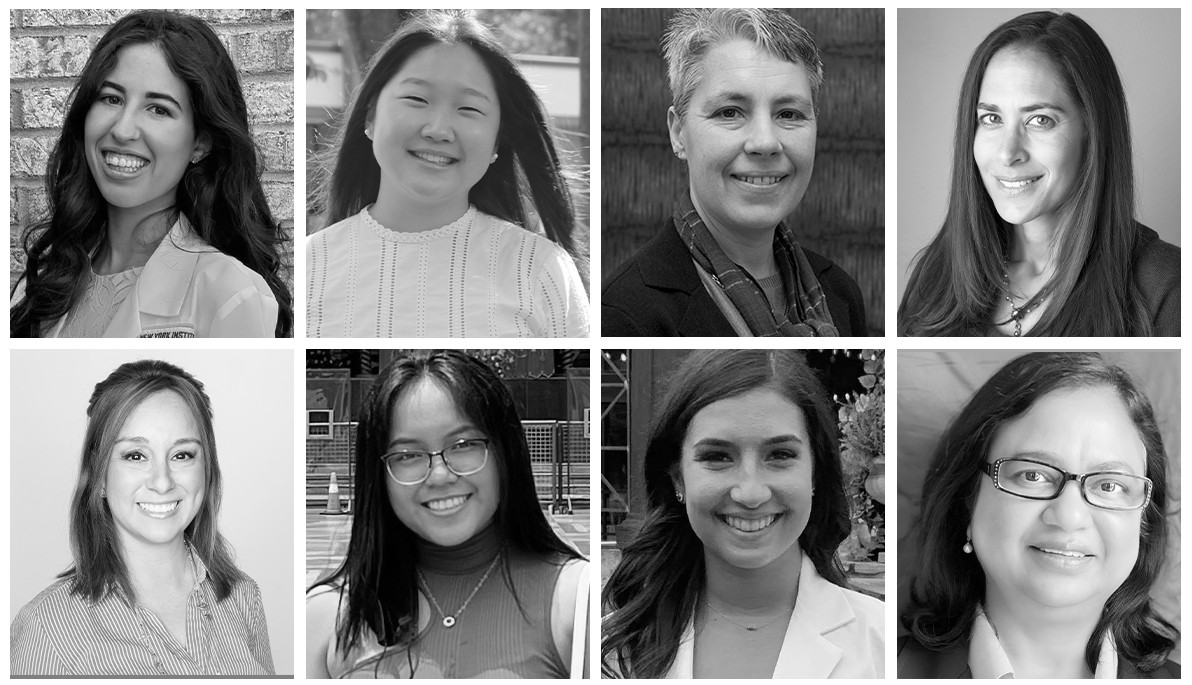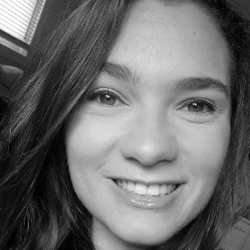News
Advocates for Women’s Health
March 7, 2023
Pictured top row from left: Kelsey Fisher, Christine Lee, Nicole Wadsworth, and Adena Leder. Pictured bottom row from left: Maria Alicia Carillo Sepulveda, Mary Margarette Sanchez, Nicole Maddie, and Niharika Nath.
New York Tech strives to recognize and celebrate the women in our community, and this Women’s History Month will highlight just a few of the many who are making significant contributions. We started with women in STEM and continue with those making strides to improve women’s healthcare. Here are highlights of New York Tech women whose work aims to bring more women into the field and improve how the medical field approaches women’s health.
From Badminton to Bioengineer
After sustaining an injury during her professional badminton career in the Philippines, Mary Margarette Sanchez decided to leverage her knack for math and pursue engineering. After settling in at New York Tech’s New York City campus, Sanchez fell in love with biology and chemistry and became a part of the life sciences-biomedical engineering program (now bioengineering). Combining science, engineering, math, and the sciences, the field was everything Sanchez wanted.
In spring 2022, Sanchez worked with Professor of Biological and Chemical Sciences Niharika Nath, Ph.D., on a research study aiming to automate the detection of cervical cancer using a method that measures and analyzes an entire cellular pap-smear image and classifies the cells into four groups: normal, mild, moderate, and severe dysplastic (presence of abnormal cells).
According to the Centers for Disease Control and Prevention, about 4,000 women die from cervical cancer every year. Through their research, Sanchez and Nath were able to demonstrate the potential of pre-cancerous cell image analysis in detecting the disease. Sanchez’s research abstract earned her second place in the Sigma Xi Research Showcase undergraduate division last spring. Since then, she has continued her cervical cancer studies with Nath, focusing on the nucleus of a pap-smear image. Sanchez expects to earn her B.S. degree this May.
Awarded for Her Research
College of Osteopathic Medicine student Nicole Maddie’s research project, “Loss of The Brown-Like Phenotype of Aortic PVAT is Associated with Mitochondrial Dysfunction in Obesity-Induced Endothelial Dysfunction in Female Rats,” investigated the connection between obesity and the fat around the aorta, known as PVAT (perivascular adipose tissue). Completed under the mentorship of Maria Alicia Carrillo Sepulveda, Ph.D., BSN, NYITCOM associate professor of biomedical sciences, Maddie’s work earned her the 2020 Hypertension New Investigator Award, sponsored by the American Heart Association’s (AHA) Council on Hypertension.
In obesity, PVAT changes from a brown-like fat to a white-like fat, thus changing its function. The research Maddie performed analyzed the connection between this change and dysfunction in mitochondria and blood vessels. The findings suggest that PVAT changes due to obesity are associated with the loss of mitochondria resulting in vascular dysfunction.
One of just 10 new investigators selected to receive the award and present abstracts at the AHA’s Hypertension Scientific Sessions 2020, Maddie says the honor reassured her that the research she is performing is relevant to the work she hopes to carry out with her future patients and can help propel the medical field forward. She expects to graduate from medical school in 2024.
Helping Women Find Their Voice
Christine Lee, a Life Sciences, B.S./Osteopathic Medicine, D.O. student, is working on research with Professor and Chair of Biological and Chemical Sciences Michael Hadjiargyrou, Ph.D., on the functionalities of Mustn1, a gene expressed predominantly in the musculoskeletal system that plays a role in bone fracture repair. But when she’s not performing academic research, Lee can be found championing for women’s success and safety.
A member of New York Tech’s Doctors Without Borders student chapter, Lee works to address the inequities of the current healthcare system and promote awareness about the most pressing issues in medicine. The chapter teaches members how to advocate for medicine that addresses the concerns of all women—helping young women find their voice and their place in the medical field.
An aspiring emergency medicine physician (she expects to graduate in 2026) with a focus on health policy and global health, Lee hopes for a future with more women in the medical field “not only to increase representation but to address the gender inequities, the engrained sexism, and the implicit biases related to the under-evaluation of female physicians in our current healthcare system,” she says.
Off campus, Lee serves as a women’s health clinic escort to safely chaperone patients seeking women’s health resources without confrontation or harm from protestors.
The Parkinson’s Project
Women with young-onset Parkinson’s disease—defined by the diagnosis of Parkinson’s before reaching age 50—comprise a demographic often overlooked when it comes to receiving care and resources. NYITCOM student Kelsey Fisher is looking to change that.
An aspiring neurologist (NYITCOM class of 2025), Fisher is working with Adena Leder (D.O. ’99), neurologist and director of New York Tech’s Rock Steady Boxing program, and her research team on the Long Island campus, participating in clinical research and hearing stories first-hand from women with young-onset Parkinson’s disease.
As a co-student coordinator for the program, which helps those with Parkinson’s manage their symptoms, Fisher says she has learned the important role exercise plays in physical health and mental health. She also credits her experience with the program for helping her understand the critical teamwork that goes into healthcare.
Ending Healthcare Bias
NYITCOM Dean Nicole Wadsworth, D.O., advocates for ending the health inequities LGBTQ+ Americans face on a day-to-day basis. Citing their predisposition to underlying conditions like asthma, hypertension, heart disease, and cancer, Wadsworth says LGBTQ+ people face greater risks from COVID-19 than others. She argues that the overwhelming effect of COVID-19 on the LGTBQ+ community is because of healthcare inequity.
Wadsworth suggests changing the ways healthcare providers are trained. Namely, better education for current and future professionals in medical schools, hospitals, and other training institutions about LGBTQ+ needs, like appropriate genders, pronouns, and names.
Firmly stating that “providing healthcare workers with the knowledge and tools to treat LGBTQ+ people competently and compassionately is an essential part of ending discrimination in our healthcare system,” she asserts that hospitals and healthcare facilities can start by implementing workplace training on diversity, equity, and inclusion.





